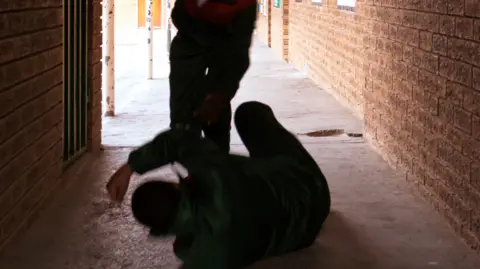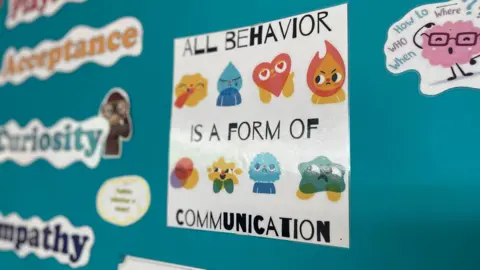Phone and shouting ban 'transforms' school plagued by fights
 BBC
BBCFights arranged in school via social media, then filmed and shared online.
Pupils leaving lessons upset about social media comments.
These were regular occurrences at Cardiff West Community High School - one of the most "challenged" schools in Wales - until mobile phones were banned as part of a range of measures introduced to tackle bad behaviour.
"Almost overnight, exclusions [for violence] reduced," said head teacher Mike Tate, who introduced the ban at the secondary school in Ely, Cardiff, last summer.
Mr Tate, who also banned shouting, said internal truancy - when pupils are in school but not lessons - was now "almost nil" and there was better focus in classrooms.
When Mr Tate became the head teacher of Cardiff West two years ago, he wanted to understand what was causing the behavioural problems at the school.
The issues included pupils bunking off lessons, being aggressive and fighting due to social media spats.
Deputy head teacher Kathryn Stevens said the problems "permeated every part of the school day".
"We were having fights at lunchtime, at break time. We were having children walking out of lessons because they were seeing messages popping up and it was causing them distress," Ms Stevens said.
Mr Tate said pupils would "come out of class because they would get a message to go and see another pupil".
"We could see that these were big issues," he added.
 Getty Images
Getty ImagesSpecific measures were introduced to target the problems, including a ban on phones for pupils, staff and visitors during the school day which was implemented last summer.
Mr Tate said it would be "naive" to claim fights had been eradicated completely, but said pupil exclusions for violence had fallen by 72% since the ban was introduced.
He said banning phones had also addressed the problem of "pupils texting one another to meet in the toilets, or be out of lessons", leading to a reduction in internal truancy.
"It's transformed behaviour," added Ms Stevens.
The Welsh government has resisted a national policy to ban mobile phones in schools, but said it was working with schools "to ensure they have policies and resources to reduce the negative impacts of mobile phones and promote learning".
'No shouting in the school'
Banning phones is not the only change the school has made.
Mr Tate said a big emphasis had been placed on staff building respectful relationships with pupils and not raising their voices.
"We are a no shout school. There's no shouting in the school," said Ms Stevens.
"You won't see potentially those old fashioned school days of children being berated by staff or shouting.
"We always try to talk with children and we always try to start conversations with: 'Is everything OK?'"

So what do the pupils make of the changes?
Sixteen-year-old Lanre believes the phone ban, brought in last year, has made a big difference to behaviour.
He said pupils were more focused in lessons and there was less bullying
"People used to be recorded and it used to go online" but that has now stopped, he said.
Lexi, 15, said better relationships between staff and pupils was important.
"I think better relationships definitely help the children become better behaved in their classes," she said.
"If they like the teacher, they will behave better than if they have a bad relationship with the teacher."

Mr Tate said that clear expectations and consistency with enforcing the rules was important.
Effort and resources have also been focused on tackling the reasons for poor behaviour.
A high number of pupils at the secondary school are "functionally illiterate", meaning they have a reading age well below average when they start Year 7.
These pupils are being given "primary style" help with reading so that they can fully understand the rest of their lessons, Mr Tate said.
"There's an absolute link between people's inability to access learning and behaviour and acting out," he added.

The school has also reviewed its curriculum following research with the local community.
Ely is one of Cardiff's most deprived suburbs and more than 60% of pupils at the school are eligible for free school meals.
The school found that not eating breakfast and consuming energy drinks were potential problems, so it has placed more emphasis on nutrition in lessons.
Mr Tate said schools had to identify "what the issues are, looking at what you can do with the money you have, and then how you can monitor the impact of what you're doing".
"But money is an issue, there's no doubt about that," he added.
"We've got to make sure that money's appropriately spent and it's spent on the right things which will impact upon teaching and learning."
Behaviour summit
A recent review by education inspectorate Estyn found secondary schools in Wales had reported a general decline in behaviour, with the most challenging pupils becoming "increasingly hard to manage".
A Welsh government survey of nearly 8,000 education staff found an increase in "challenging or disruptive behaviours" since the pandemic.
More than half of respondents working in secondary schools said they had concerns about pupils bringing weapons to school.
Nearly half of staff working in primary schools said physical assaults on teachers were a serious concern.
Education leaders will meet for a national behaviour summit hosted by the Welsh government on Thursday, prompted by the growing concerns about behaviour as well as an incident at Ysgol Dyffryn Aman in Carmarthenshire last year when a pupil stabbed two members of staff and a fellow student.
The Welsh government said this summit would "provide clear guidance on the use of mobile phones".
So, could bringing together educational leaders from local authorities, unions and schools pave the way for a solution to the challenges?
"I think it's an understanding of where schools are and what schools deal with, because we deal with far more than just teaching and learning," said Mr Tate.
Additional reporting by Gareth Bryer and Sanjana Idnani.
